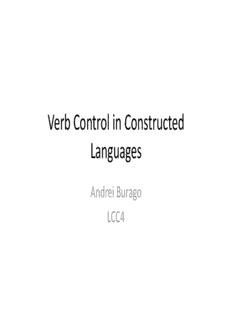
Slides (.pdf) PDF
Preview Slides (.pdf)
VVeerrbb CCoonnttrrooll iinn CCoonnssttrruucctteedd Langguagges AAnnddrreeii BBuurraaggoo LCC4 Indirect Direct Object OObbjjeecctt Adverbial MModdiiffiier VERB Subject Adverbial Clause CCompllementt Adverb Indirect Direct Object OObbjjeecctt Adverbial MModdiiffiier VERB Subject Adverbial Clause CCompllementt Adverb How do you mark all these? SSuubbjjeecctt aanndd OObbjjeecctt:: EErrggaattiivviittyy Bill cooks the egg. TThhee eegggg ccooookkss ffoorr 1100 mmiinnuutteess.. The same thing is object in one case and subject in the other. Mark them differently vs. Mark them the same? No verbs are ergative vs. Some vs. All verbs are? VVeerrbb VVaalleennccyy In Englliishh: II ppuutt iitt oonn tthhee ttaabbllee I put it I put SSoommee vveerrbbss mmaayy rreeqquuiirree aa cceerrttaaiinn nnuummbbeerr ooff objects CCan use iitt as a wordd‐bbuiillddiing ttooll Caveat: valency tends to get expanded/reduced Direct Object vs. Indirect Object vs. Adverbial Modifier vs. Complement Semantically it is not that easy to tell tthheemm aappaarrtt!! • A direct object in one language may become indirect in another and a modifier in the third •• VVeerrbb wwiitthh ssiimmiillaarr mmeeaanniinngg mmaayy ttrreeaatt tthheeiirr objects differently Direct Object vs. Indirect Object vs. Adverbial Modifier vs. Complement Semantically it is not that easy to tell tthheemm aappaarrtt!! Examples: (a random sampling) • obey (direct or indirect object?) • relly ((ddiirectt or iinddiirectt obbjjectt??)) • sppeak ((a langguagge – direct objject?)) • remember (direct or indirect object?) Direct Object vs. Indirect Object vs. Adverbial Modifier vs. Complement Semantically it is not that easy to tell tthheemm aappaarrtt!! Examples: (continued) • chase a bus / run after a bus / behind a bus • hhiitt fforceffulllly // wiitthh fforce // wiitthh a magiic fforce • ppunch someone in the nose • and so on. AAvvooiidd ccooppyyiinngg yyoouurr nnaattllaanngg • Natlang’s use of cases / prepositions is often illoggical • A native speaker of another language may not uunnddeerrssttaanndd yyoouu aatt aallll • Be creative! DDiiccttiioonnaarryy AApppprrooaacchh Define what objects your verb takes it its ddiiccttiioonnaarryy eennttrryy • It’s pretty straightforward • LogLan: each “predicate” defines it’s arguments • DDoowwnnssiiddee:: lloottss ooff wwoorrkk,, lloottss ooff rreemmeemmbbeerriinngg (LogLan’s “is ticket” has 9 arguments!) •• LLaanngguuaaggeess tteenndd ttoo eexxppaanndd// rreedduuccee vveerrbb vvaalleennccyy • Tip: you can base control on morphology
Description: